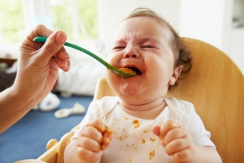告别“食物战斗”心态 培养健康饮食习惯

As a parent, it can feel frustrating when we work so hard to get dinner on the table only to have our children take two or three bites. It can be tempting to try and force them to keep eating and clear their plate.
Some parents have felt the need to encourage (and sometimes force) children to finish all of the food on their plate. Some of these reasons include:
1. Cultural norms and expectations.
2. Growing up in, or currently living in, a family where food is scarce and don’t want to waste food.
3. View of finishing food as a sign of respect for the person who made the food. “It’s rude not to finish Grandma’s dinner.”
4. Want to feel a sense of control over mealtimes.
5. “We worked hard to bring food to this table — you need to eat it.”
As you can see, the idea of children having to finish everything on their plates is often NOT about the food and actually more about other factors.
In recent years, professionals have been encouraging parents to steer clear of the “you must clean your plate” mentality (心态). This kind of thinking doesn’t actually serve our children.
By making them finish everything on their plate, we push them to overeat rather than trust their internal radar (雷达). We are not establishing a sense of trust in our children, and as they get older, they may begin to doubt their internal radar, which could lead to many different challenges, including eating disorders.
If we are forcing kids to eat their whole plate, and then we praise them when they finish their food, we are teaching them to eat for praise. We also are teaching them that we will be happier with them if they eat more than they can handle and clear their plate, than if they eat just enough to feel full. Does this sound like something we want to establish in our children?
原创编写 版权所有 侵权必究! 每日更新 个性化阅读 英语飙升!